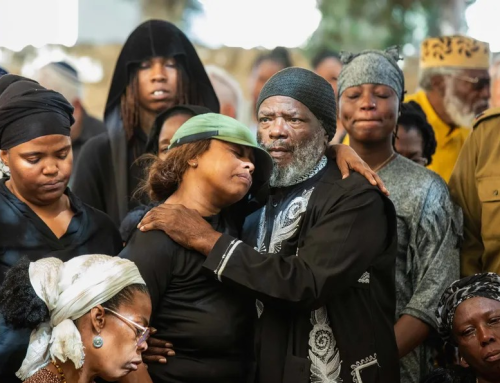Emmanuel Sani Ujah said he recalls the night of February 3, 2014, as the day he “died,” but God brought him back. Ujah was involved in a car accident, which became the impetus for his Catch Them Young Bible Club.
“I was bedridden for a month,” he said. “It was during that time I truly understood what it meant to be given a second chance.”
Though as a teenager Ujah had a vibrant faith, he said disappointment dampened his spirit and love for God after he failed to secure admission to a university. Lying immobile in the hospital, 21-year-old Ujah thought about his earlier excitement for his faith.
Convinced that God had spared his life for a purpose, Ujah decided to start a club to help children develop and keep their fire for God into adulthood. Months later, he started the first club with six children in Abuja, Nigeria.
Young Nigerians like Ujah can face many challenges to faith. Cult groups, street gangs, and internet fraudsters in Nigeria target high school and university students for recruitment. Apathy and social influences can also pull them away from the church. So Christian clubs are fighting to capture children’s hearts first.
“There’s a big problem with the sense of belonging,” pastor Fortune Agula Musa said. “One of the things missing in church is that children between the ages of 12 and 18 don’t know where to fit. They are not children anymore, and they are not adults.”
In Nigeria, cults and fraud networks recruit and manipulate teens by pretending to care about issues that affect them, standing up for them against injustice, and offering friendship to vulnerable students. Cult groups in Nigeria often have ties to organized crime, according to research by the United Nations Office on Drugs and Crime.
Students pulled into these organizations must show loyalty to the groups and may engage in illegal acts. In some cases, clashes between cults groups turn deadly.
Musa’s church, Throne Room Glory Gwagwalada in Federal Capital Territory, Nigeria, started The Oxygen Club for 12-to-19-year-olds. The pastor formed the Bible club because of his own experiences: In 2004, a cult attempted to recruit him during his freshman year at the Federal University of Agriculture in Benue State.
Musa said his membership in a Christian club called All for Him saved him. The club gave new students on campus an orientation and warned them about the signs of cult recruitment.
Because of this, Musa recognized the cult’s “courtship” for what it was. First, members of the cult invited him and other first-year students to a party for freshmen. But that party was the beginning of the recruitment process.
“It was supposed to be like a riverside party, but when it got late in the night, they put off the generator,” Musa said. “And then it became a recruitment drive. They called it blending—they blend by beating them badly.”
Musa chose not to go, but students who attended told him about it later. Some students resisted the blending when they realized the cult had tricked them into attending a recruitment event. Musa said those in the cult beat the resisters especially hard, while those who showed a willingness to join were not so badly beaten.
Instead of getting involved in cult activities, Musa directed his energy into dance, drama, music, and learning at All for Him. This helped him remain “grounded in faith,” an experience he tries to replicate for students attending The Oxygen Club.
In addition to dealing with cult groups, Nigerian students face challenges similar to many in the US. Exposure to peer pressure, to new academic viewpoints, and to different religions in high school or college can lead underprepared students to question or to leave Christianity. Apathy toward faith can settle in as other priorities clamor for attention.
In the US, 35 percent of adults have switched religions between childhood and adulthood. Although changing religions is less common in Nigeria, a growing number of young people are moving from Christianity to traditional African religions. Research by George Barna indicates that an individual’s worldview sets around age 13—even if religious affiliation shifts later—so early discipleship is crucial.
“When children are taught the way of the Lord early in life, they will avoid anything that will lead them astray,” Ujah said.
Ujah competes with cult recruitment by engaging Bible-club members in a variety of activities. The club builds biblical knowledge through quizzes. The group also holds weekly meetings that give members a time and place to talk about daily challenges, and it provides mentorship from older members. Ujah also uses his background in tech to teach practical topics such as basic technology skills.
An early member of the club, Ashiofe Lakoju, said the club helped him shape and sustain Christian values. Ujah taught lessons on peer pressure and sexual purity, in addition to regular Bible lessons, to young men in the club.
“He gives us Scriptures to back up every teaching he takes us through,” Lakoju said.
Lakoju credited discipleship from Catch Them Young and from his church for helping him when curiosity about sex led him into pornography and anger issues resulted in fights during high school. He remembered that “the Scriptures say [to] guard your heart with all diligence.”
Ujah’s efforts have not always yielded success. He said one of his most failures was when one teen girl became pregnant with her boyfriend despite Ujah’s discipleship. “That incident still haunts me to this day,” he said.
He still blames himself, saying he feels he should have done more to guide her. Though more than 33 children have graduated from the club, Ujah still remembers the one he feels he let down.
“It’s a wound I carry and a lesson that keeps me watchful and prayerful over every child now,” Ujah told CT.
The club is now discipling 30 children and has expanded to include a group in Lokoja, Nigeria, but Ujah said lack of teachers presents a real challenge.
“It limits how far we can reach,” Ujah said. “With more willing hands and hearts, we could touch even more young lives.”
Original Article – Cults Target Nigerian Youth. Bible Clubs Try to Reach Kids First. – Christianity Today







